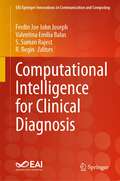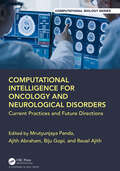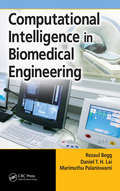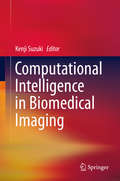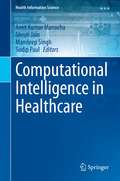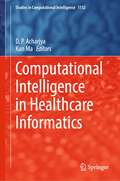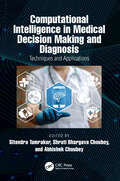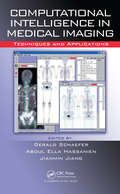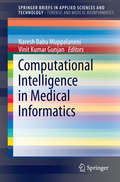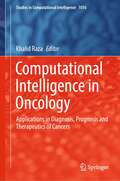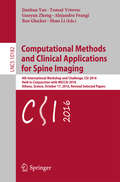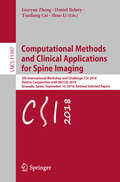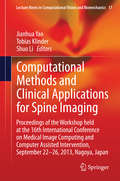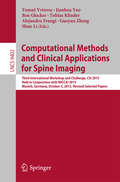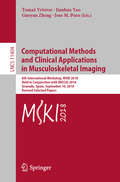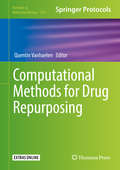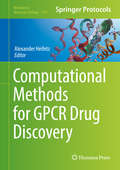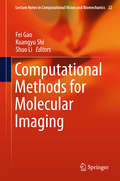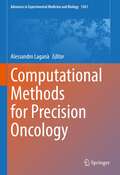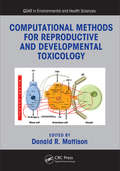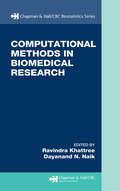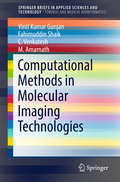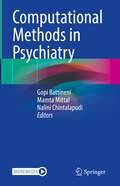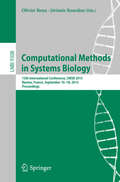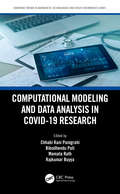- Table View
- List View
Computational Intelligence for Clinical Diagnosis (EAI/Springer Innovations in Communication and Computing)
by Valentina Emilia Balas Ferdin Joe John Joseph S. Suman Rajest R. ReginThis book contains multidisciplinary advancements in healthcare and technology through artificial intelligence (AI). The topics are crafted in such a way to cover all the areas of healthcare that require AI for further development. Some of the topics that contain algorithms and techniques are explained with the help of source code developed by the chapter contributors. The book covers the advancements in AI and healthcare from the Covid 19 pandemic and also analyzes the readiness and need for advancements in managing yet another pandemic in the future. Most of the technologies addressed in this book are added with a concept of encapsulation to obtain a cookbook for anyone who needs to reskill or upskill themselves in order to contribute to an advancement in the field. This book benefits students, professionals, and anyone from any background to learn about digital disruptions in healthcare.
Computational Intelligence for Oncology and Neurological Disorders: Current Practices and Future Directions (Chapman & Hall/CRC Computational Biology Series)
by Mrutyunjaya Panda, Ajith Abraham, Biju Gopi, and Reuel AjithWith the advent of computational intelligence-based approaches, such as bio-inspired techniques, and the availability of clinical data from various complex experiments, medical consultants, researchers, neurologists, and oncologists, there is huge scope for CI-based applications in medical oncology and neurological disorders. This book focuses on interdisciplinary research in this field, bringing together medical practitioners dealing with neurological disorders and medical oncology along with CI investigators.The book collects high-quality original contributions, containing the latest developments or applications of practical use and value, presenting interdisciplinary research and review articles in the field of intelligent systems for computational oncology and neurological disorders. Drawing from work across computer science, physics, mathematics, medical science, psychology, cognitive science, oncology, and neurobiology among others, it combines theoretical, applied, computational, experimental, and clinical research. It will be of great interest to any neurology or oncology researchers focused on computational approaches.
Computational Intelligence in Biomedical Engineering
by Marimuthu Palaniswami Rezaul Begg Daniel T.H. LaiAs in many other fields, biomedical engineers benefit from the use of computational intelligence (CI) tools to solve complex and non-linear problems. The benefits could be even greater if there were scientific literature that specifically focused on the biomedical applications of computational intelligence techniques. The first comprehensive field-
Computational Intelligence in Biomedical Imaging
by Kenji SuzukiComputational Intelligence in Biomedical Imaging is a comprehensive overview of the state-of-the-art computational intelligence research and technologies in biomedical images with emphasis on biomedical decision making. Biomedical imaging offers useful information on patients' medical conditions and clues to causes of their symptoms and diseases. Biomedical images, however, provide a large number of images which physicians must interpret. Therefore, computer aids are demanded and become indispensable in physicians' decision making. This book discusses major technical advancements and research findings in the field of computational intelligence in biomedical imaging, for example, computational intelligence in computer-aided diagnosis for breast cancer, prostate cancer, and brain disease, in lung function analysis, and in radiation therapy. The book examines technologies and studies that have reached the practical level, and those technologies that are becoming available in clinical practices in hospitals rapidly such as computational intelligence in computer-aided diagnosis, biological image analysis, and computer-aided surgery and therapy.
Computational Intelligence in Healthcare (Health Information Science)
by Sudip Paul Shruti Jain Amit Kumar Manocha Mandeep SinghArtificial intelligent systems, which offer great improvement in healthcare sector assisted by machine learning, wireless communications, data analytics, cognitive computing, and mobile computing provide more intelligent and convenient solutions and services. With the help of the advanced techniques, now a days it is possible to understand human body and to handle & process the health data anytime and anywhere. It is a smart healthcare system which includes patient, hospital management, doctors, monitoring, diagnosis, decision making modules, disease prevention to meet the challenges and problems arises in healthcare industry. Furthermore, the advanced healthcare systems need to upgrade with new capabilities to provide human with more intelligent and professional healthcare services to further improve the quality of service and user experience. To explore recent advances and disseminate state-of-the-art techniques related to intelligent healthcare services and applications. This edited book involved in designing systems that will permit the societal acceptance of ambient intelligence including signal processing, imaging, computing, instrumentation, artificial intelligence, internet of health things, data analytics, disease detection, telemedicine, and their applications. As the book includes recent trends in research issues and applications, the contents will be beneficial to Professors, researchers, and engineers. This book will provide support and aid to the researchers involved in designing latest advancements in communication and intelligent systems that will permit the societal acceptance of ambient intelligence. This book presents the latest research being conducted on diverse topics in intelligence technologies with the goal of advancing knowledge and applications healthcare sector and to present the latest snapshot of the ongoing research as well as to shed further light on future directions in this space. The aim of publishing the book is to serve for educators, researchers, and developers working in recent advances and upcoming technologies utilizing computational sciences.
Computational Intelligence in Healthcare Informatics (Studies in Computational Intelligence #1132)
by Kun Ma D. P. AcharjyaThe book presents advancements in computational intelligence in perception with healthcare applications. Besides, the concepts, theory, and applications in various domains of healthcare systems including decision making in healthcare management, disease diagnosis, and electronic health records will be presented in a lucid manner. To achieve these objectives, both theoretical advances and its applications to healthcare problems will be stressed upon. This has been done to make the edited book more flexible and to stimulate further research interest in topics. The book is divided into four sections such as theoretical foundation of computational intelligence techniques, computational intelligence in analyzing health data, computational intelligence in electronic health record (EHR), and computational intelligence in ethical issues in health care.
Computational Intelligence in Medical Decision Making and Diagnosis: Techniques and Applications (Computational Intelligence Techniques)
by Sitendra Tamrakar Shruti Bhargava Choubey Abhishek ChoubeyComputation intelligence (CI) paradigms, including artificial neural networks, fuzzy systems, evolutionary computing techniques, and intelligent agents, form the basis of making clinical decisions. This book explains different aspects of the current research on CI technologies applied in the field of medical diagnosis. It discusses critical issues related to medical diagnosis, like uncertainties in the medical domain, problems in the medical data, especially dealing with time-stamped data, and knowledge acquisition. Features: Introduces recent applications of new computational intelligence technologies focusing on medical diagnosis issues. Reviews multidisciplinary research in health care, like data mining, medical imaging, pattern recognition, and so forth. Explores intelligent systems and applications of learning in health-care challenges, along with the representation and reasoning of clinical uncertainty. Addresses problems resulting from automated data collection in modern hospitals, with possible solutions to support medical decision-making systems. Discusses current and emerging intelligent systems with respect to evolutionary computation and its applications in the medical domain. This book is aimed at researchers, professionals, and graduate students in computational intelligence, signal processing, imaging, artificial intelligence, and data analytics.
Computational Intelligence in Medical Imaging: Techniques and Applications
by Gerald Schaefer Aboul Ella Hassanien Jianmin JiangCI Techniques & Algorithms for a Variety of Medical Imaging SituationsDocuments recent advances and stimulates further researchA compilation of the latest trends in the field, Computational Intelligence in Medical Imaging: Techniques and Applications explores how intelligent computing can bring enormous benefit to existing technology in medical
Computational Intelligence in Medical Informatics (SpringerBriefs in Applied Sciences and Technology)
by Vinit Kumar Gunjan Naresh Babu MuppalaneniThis Brief highlights Informatics and related techniques to Computer Science Professionals, Engineers, Medical Doctors, Bioinformatics researchers and other interdisciplinary researchers. Chapters include the Bioinformatics of Diabetes and several computational algorithms and statistical analysis approach to effectively study the disorders and possible causes along with medical applications.
Computational Intelligence in Oncology: Applications in Diagnosis, Prognosis and Therapeutics of Cancers (Studies in Computational Intelligence #1016)
by Khalid RazaThis book encapsulates recent applications of CI methods in the field of computational oncology, especially cancer diagnosis, prognosis, and its optimized therapeutics. The cancer has been known as a heterogeneous disease categorized in several different subtypes. According to WHO’s recent report, cancer is a leading cause of death worldwide, accounting for over 10 million deaths in the year 2020. Therefore, its early diagnosis, prognosis, and classification to a subtype have become necessary as it facilitates the subsequent clinical management and therapeutics plan. Computational intelligence (CI) methods, including artificial neural networks (ANNs), fuzzy logic, evolutionary computations, various machine learning and deep learning, and nature-inspired algorithms, have been widely utilized in various aspects of oncology research, viz. diagnosis, prognosis, therapeutics, and optimized clinical management. Appreciable progress has been made toward the understanding the hallmarks of cancer development, progression, and its effective therapeutics. However, notwithstanding the extrinsic and intrinsic factors which lead to drastic increment in incidence cases, the detection, diagnosis, prognosis, and therapeutics remain an apex challenge for the medical fraternity. With the advent in CI-based approaches, including nature-inspired techniques, and availability of clinical data from various high-throughput experiments, medical consultants, researchers, and oncologists have seen a hope to devise and employ CI in various aspects of oncology. The main aim of the book is to occupy state-of-the-art applications of CI methods which have been derived from core computer sciences to back medical oncology. This edited book covers artificial neural networks, fuzzy logic and fuzzy inference systems, evolutionary algorithms, various nature-inspired algorithms, and hybrid intelligent systems which are widely appreciated for the diagnosis, prognosis, and optimization of therapeutics of various cancers. Besides, this book also covers multi-omics exploration, gene expression analysis, gene signature identification of cancers, genomic characterization of tumors, anti-cancer drug design and discovery, drug response prediction by means of CI, and applications of IoT, IoMT, and blockchain technology in cancer research.
Computational Methods and Clinical Applications for Spine Imaging: 4th International Workshop and Challenge, CSI 2016, Held in Conjunction with MICCAI 2016, Athens, Greece, October 17, 2016, Revised Selected Papers (Lecture Notes in Computer Science #10182)
by Tomaž Vrtovec Jianhua Yao Ben Glocker Alejandro Frangi Guoyan Zheng Shuo LiThis book contains the full papers presented at the MICCAI 2014 workshop on Computational Methods and Clinical Applications for Spine Imaging. The workshop brought together scientists and clinicians in the field of computational spine imaging. The chapters included in this book present and discuss the new advances and challenges in these fields, using several methods and techniques in order to address more efficiently different and timely applications involving signal and image acquisition, image processing and analysis, image segmentation, image registration and fusion, computer simulation, image based modeling, simulation and surgical planning, image guided robot assisted surgical and image based diagnosis. The book also includes papers and reports from the first challenge on vertebra segmentation held at the workshop.
Computational Methods and Clinical Applications for Spine Imaging: 5th International Workshop and Challenge, CSI 2018, Held in Conjunction with MICCAI 2018, Granada, Spain, September 16, 2018, Revised Selected Papers (Lecture Notes in Computer Science #11397)
by Guoyan Zheng Shuo Li Daniel Belavy Yunliang CaiThis book constitutes the refereed proceedings of the 5th International Workshop and Challenge on Computational Methods and Clinical Applications for Spine Imaging, CSI 2018, held in conjunction with MICCAI 2018, in Granada, Spain, in September 2018. The 8 full papers presented together with 8 short papers and 1 keynote were carefully reviewed and selected for inclusion in this volume. Papers on novel methodology and clinical research, and also papers which demonstrate the performance of methods on the provided challenges, the aim is to cover both theoretical and very practical aspects of computerized spinal imaging.
Computational Methods and Clinical Applications for Spine Imaging: Proceedings of the Workshop held at the 16th International Conference on Medical Image Computing and Computer Assisted Intervention, September 22-26, 2013, Nagoya, Japan (Lecture Notes in Computational Vision and Biomechanics #17)
by Jianhua Yao Tobias Klinder Shuo LiThis book contains the full papers presented at the MICCAI 2013 workshop Computational Methods and Clinical Applications for Spine Imaging. The workshop brought together researchers representing several fields, such as Biomechanics, Engineering, Medicine, Mathematics, Physics and Statistic. The works included in this book present and discuss new trends in those fields, using several methods and techniques in order to address more efficiently different and timely applications involving signal and image acquisition, image processing and analysis, image segmentation, image registration and fusion, computer simulation, image based modelling, simulation and surgical planning, image guided robot assisted surgical and image based diagnosis.
Computational Methods and Clinical Applications for Spine Imaging: Third International Workshop and Challenge, CSI 2015, Held in Conjunction with MICCAI 2015, Munich, Germany, October 5, 2015, Proceedings (Lecture Notes in Computer Science #9402)
by Tomaž Vrtovec Jianhua Yao Ben Glocker Tobias Klinder Alejandro Frangi Guoyan Zheng Shuo LiThis book contains the full papers presented at the MICCAI 2014 workshop on Computational Methods and Clinical Applications for Spine Imaging. The workshop brought together scientists and clinicians in the field of computational spine imaging. The chapters included in this book present and discuss the new advances and challenges in these fields, using several methods and techniques in order to address more efficiently different and timely applications involving signal and image acquisition, image processing and analysis, image segmentation, image registration and fusion, computer simulation, image based modeling, simulation and surgical planning, image guided robot assisted surgical and image based diagnosis. The book also includes papers and reports from the first challenge on vertebra segmentation held at the workshop.
Computational Methods and Clinical Applications in Musculoskeletal Imaging: 6th International Workshop, MSKI 2018, Held in Conjunction with MICCAI 2018, Granada, Spain, September 16, 2018, Revised Selected Papers (Lecture Notes in Computer Science #11404)
by Tomaž Vrtovec Jianhua Yao Guoyan Zheng Jose M. PozoThis book constitutes the refereed proceedings of the 6th International Workshop on Computational Methods and Clinical Applications for Musculoskeletal Imaging, MSKI 2018, held in conjunction with MICCAI 2018, in Granada, Spain, in September 2018. The 13 workshop papers were carefully reviewed and selected for inclusion in this volume. Topics of interest include all major aspects of musculoskeletal imaging, for example: clinical applications of musculoskeletal computational imaging; computer-aided detection and diagnosis of conditions of the bones, muscles and joints; image-guided musculoskeletal surgery and interventions; image-based assessment and monitoring of surgical and pharmacological treatment; segmentation, registration, detection, localization and visualization of the musculoskeletal anatomy; statistical and geometrical modeling of the musculoskeletal shape and appearance; image-based microstructural characterization of musculoskeletal tissue; novel techniques for musculoskeletal imaging.
Computational Methods for Drug Repurposing (Methods in Molecular Biology #1903)
by Quentin VanhaelenThis detailed book explores techniques commonly used for research into drug repurposing, a well-known strategy to find alternative indications for drugs which have already undergone toxicology and pharma-kinetic studies but have failed later stages during the development, via computational methods. Thereby, it addresses the intense challenges of identifying the appropriate type of algorithm and relevant technical information for computational repurposing. Written for the highly successful Methods in Molecular Biology series, the authors of each chapter use their experience in the field to describe the implementation and successful use of a specific repurposing method thus providing lab-ready instruction. Authoritative and practical, Computational Methods for Drug Repurposing serves as an ideal guide to researchers interested in this vital area of drug development.
Computational Methods for GPCR Drug Discovery (Methods in Molecular Biology #1705)
by Alexander HeifetzThis volume looks at modern computational strategies and techniques used in GPCR drug discovery including structure and ligand-based approaches and cheminformatics. The chapters in this book describe how these approaches can be applied to address key drug discovery issues, such as receptor structure modelling, function and dynamics, prediction of protein-water-ligand interactions and binding kinetics, free energy of binding, interconversion between agonists and antagonists, deorphanization of GPCRs, and the discovery of biased and allosteric modulators. Written in the highly successful Methods in Molecular Biology series format, chapters include introductions to their respective topics, lists of the necessary software and tools, step-by-step, readily reproducible modelling protocols, and tips on troubleshooting and avoiding known pitfalls. Cutting-edge and unique,Computational Methods for GPCR Drug Discovery is a valuable resource for structural and molecular biologists, computational and medicinal chemists, pharmacologists, and drug designers.
Computational Methods for Molecular Imaging (Lecture Notes in Computational Vision and Biomechanics #22)
by Shuo Li Fei Gao Kuangyu ShiThis volume contains original submissions on the development and application of molecular imaging computing. The editors invited authors to submit high-quality contributions on a wide range of topics including, but not limited to: * Image Synthesis & Reconstruction of Emission Tomography (PET, SPECT) and other Molecular Imaging Modalities * Molecular Imaging Enhancement * Data Analysis of Clinical & Pre-clinical Molecular Imaging * Multi-Modal Image Processing (PET/CT, PET/MR, SPECT/CT, etc. ) * Machine Learning and Data Mining in Molecular Imaging. Molecular imaging is an evolving clinical and research discipline enabling the visualization, characterization and quantification of biological processes taking place at the cellular and subcellular levels within intact living subjects. Computational methods play an important role in the development of molecular imaging, from image synthesis to data analysis and from clinical diagnosis to therapy individualization. This work will bring readers from academia and industry up to date on the most recent developments in this field.
Computational Methods for Precision Oncology (Advances in Experimental Medicine and Biology #1361)
by Alessandro LaganàPrecision medicine holds great promise for the treatment of cancer and represents a unique opportunity for accelerated development and application of novel and repurposed therapeutic approaches. Current studies and clinical trials demonstrate the benefits of genomic profiling for patients whose cancer is driven by specific, targetable alterations. However, precision oncologists continue to be challenged by the widespread heterogeneity of cancer genomes and drug responses in designing personalized treatments. Chapters provide a comprehensive overview of the computational approaches, methods, and tools that enable precision oncology, as well as related biological concepts. Covered topics include genome sequencing, the architecture of a precision oncology workflow, and introduces cutting-edge research topics in the field of precision oncology. This book is intended for computational biologists, bioinformaticians, biostatisticians and computational pathologists working in precision oncology and related fields, including cancer genomics, systems biology, and immuno-oncology.
Computational Methods for Reproductive and Developmental Toxicology (QSAR in Environmental and Health Sciences)
by Donald R. MattisonBuilding from the perspective of reproductive and developmental biology, Computational Methods for Reproductive and Developmental Toxicology provides a timely and comprehensive overview of approaches in reproductive and developmental toxicology.The book, which is part of the QSAR in Environmental and Health Sciences series, is divided into three br
Computational Methods in Biomedical Research
by Ian MuehlenhausContinuing advances in biomedical research and statistical methods call for a constant stream of updated, cohesive accounts of new developments so that the methodologies can be properly implemented in the biomedical field. Responding to this need, Computational Methods in Biomedical Research explores important current and emerging computatio
Computational Methods in Molecular Imaging Technologies (SpringerBriefs in Applied Sciences and Technology)
by Vinit Kumar Gunjan Fahimuddin Shaik C Venkatesh M. AmarnathThis book highlights the experimental investigations that have been carried out on magnetic resonance imaging and computed tomography (MRI & CT) images using state-of-the-art Computational Image processing techniques, and tabulates the statistical values wherever necessary. In a very simple and straightforward way, it explains how image processing methods are used to improve the quality of medical images and facilitate analysis. It offers a valuable resource for researchers, engineers, medical doctors and bioinformatics experts alike.
Computational Methods in Psychiatry
by Mamta Mittal Gopi Battineni Nalini ChintalapudiThis book presents a particular area of interest in computing psychiatry with the modelling of mood and anxiety disorders. It highlights various methods for building these models. Clinical applications are prevalent due to the growth and interaction of these multiple approaches. Besides, it outlines some original predictive and computational modelling ideas for enhancing psychological treatment interventions. Computational psychiatry combines multiple levels and types of computation with different data types to improve mental illness understanding, prediction, and treatment.
Computational Methods in Systems Biology: 13th International Conference, CMSB 2015, Nantes, France, September 16-18, 2015, Proceedings (Lecture Notes in Computer Science #9308)
by Olivier Roux Jérémie BourdonThis book constitutes the refereed proceedings of the 13th International Conference on Computational Methods in Systems Biology, CMSB 2015, held in Nantes, France, in September 2015. The 20 full papers and 2 short papers presented were carefully reviewed and selected from 43 full and 4 short paper submissions. The papers cover a wide range of topics in the analysis of biological systems, networks and data such as model checking, stochastic analysis, hybrid systems, circadian clock, time series data, logic programming, and constraints solving ranging from intercellular to multiscale.
Computational Modeling and Data Analysis in COVID-19 Research (Emerging Trends in Biomedical Technologies and Health informatics)
by Chhabi Rani Panigrahi, Bibudhendu Pati, Mamata Rath and Rajkumar BuyyaThis book covers recent research on the COVID-19 pandemic. It includes the analysis, implementation, usage, and proposed ideas and models with architecture to handle the COVID-19 outbreak. Using advanced technologies such as artificial intelligence (AI) and machine learning (ML), techniques for data analysis, this book will be helpful to mitigate exposure and ensure public health. We know prevention is better than cure, so by using several ML techniques, researchers can try to predict the disease in its early stage and develop more effective medications and treatments. Computational technologies in areas like AI, ML, Internet of Things (IoT), and drone technologies underlie a range of applications that can be developed and utilized for this purpose. Because in most cases there is no one solution to stop the spreading of pandemic diseases, and the integration of several tools and tactics are needed. Many successful applications of AI, ML, IoT, and drone technologies already exist, including systems that analyze past data to predict and conclude some useful information for controlling the spread of COVID-19 infections using minimum resources. The AI and ML approach can be helpful to design different models to give a predictive solution for mitigating infection and preventing larger outbreaks. This book: Examines the use of artificial intelligence (AI), machine learning (ML), Internet of Things (IoT), and drone technologies as a helpful predictive solution for controlling infection of COVID-19 Covers recent research related to the COVID-19 pandemic and includes the analysis, implementation, usage, and proposed ideas and models with architecture to handle a pandemic outbreak Examines the performance, implementation, architecture, and techniques of different analytical and statistical models related to COVID-19 Includes different case studies on COVID-19 Dr. Chhabi Rani Panigrahi is Assistant Professor in the Department of Computer Science at Rama Devi Women’s University, Bhubaneswar, India. Dr. Bibudhendu Pati is Associate Professor and Head of the Department of Computer Science at Rama Devi Women’s University, Bhubaneswar, India. Dr. Mamata Rath is Assistant Professor in the School of Management (Information Technology) at Birla Global University, Bhubaneswar, India. Prof. Rajkumar Buyya is a Redmond Barry Distinguished Professor and Director of the Cloud Computing and Distributed Systems (CLOUDS) Laboratory at the University of Melbourne, Australia.
